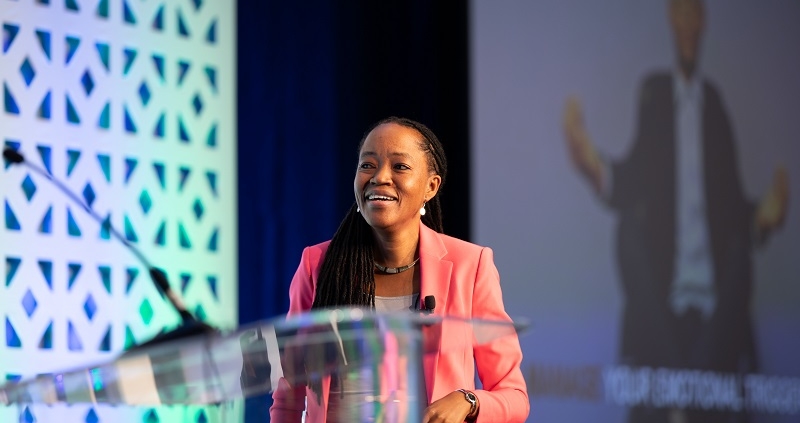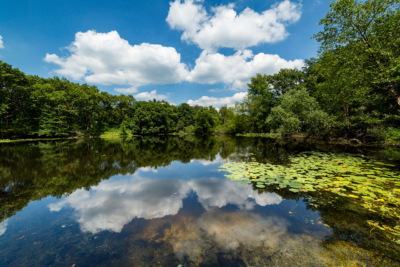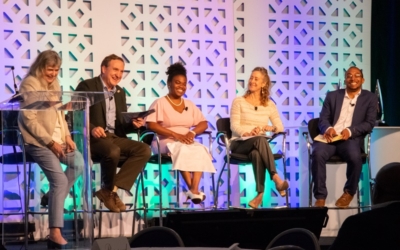Sylvia Baffour: Cultivating Resilience in Nature and Ourselves – A Conservation Conference Recap
Motivational speaker, author and executive coach Sylvia Baffour is no stranger to the beauty and diversity of nature around the world, having traveled to and lived in more than 20 countries. When she presented a keynote address at WHC Conservation Conference 2023, she began by expressing her appreciation for the work that WHC members and partners do every day to support the majesty of the earth.
“It brings me great comfort to know that every single day, you are diligently working towards developing and implementing conservation programs and initiatives in very innovative ways,” Baffour said. “I appreciate the fact that, as part of WHC, you are working diligently to bridge the gap between environmental conservation and corporate interests – which isn’t always an easy dance.” Baffour’s appreciation for Conference attendees went beyond these remarks, as she ended up staying the rest of the day at the event, signing books, chatting with corporate conservationists and even celebrating at the evening’s Awards Dinner.
Author of I Dare You to Care and one of HubSpot’s Top 15 female motivational speakers, Baffour has a wealth of knowledge on topics like emotional intelligence, diversity and inclusion and — in the case of her talk at WHC Conservation Conference — resilience. How does resilience relate to the everyday work of conservation professionals? Baffour explained that there are two parts to resilience: work to sustain the planet and work to support ourselves. These two elements work in tandem with each other — conservationists are cultivating resilience for the planet through restoration efforts, and as stewards of the planet, we also need to focus on our own resilience. Much like putting on one’s own oxygen mask before helping others, corporate conservation professionals must be able to build their own resilience in order to better support the resilience of nature.
Resilience, Baffour explained, is not about trying to control external impacts that are inherently uncontrollable, but rather learning how to manage these impacts internally. We all face challenges and uncertainty in the course of our work, but during her keynote, Baffour shared several habits to foster resilience that each of us can practice to prepare for difficult moments.
She started by challenging the audience to commit to failing better. In line with WHC President Margaret O’Gorman’s State of Corporate Conservation, Baffour quoted poet Smauel Beckett’s aphorism: “Ever tried. Ever failed. No matter. Try Again. Fail again. Fail better.” Baffour went on to share her experience being mentored by Dr. Maya Angelou, who told Baffour she would often write for eight hours only to find that just a single sentence was salvageable.
Similarly, a long-term commitment to biodiversity uplift requires potentially failing and learning from this failure. Baffour stressed the importance of coming back to a project — a pollinator garden, for example — season after season, recognizing why it failed and starting over, all the while learning from the experience. By committing to failing better, whether by scrapping eight hours’ worth of writing or restarting a pollinator garden, we grow and improve.
Another of Baffour’s resilience habits is to anticipate one’s own disruptors. She recounted eating at an outdoor restaurant in her home country of Ghana when a lizard crawled up her pant leg and Baffour, who bravely admitted to a room full of wildlife enthusiasts that she has a fear of reptiles, panicked in her efforts to safely free it. Lizards, Baffour said, are her disruptor, and each of us can name and recognize the “lizards” in our own work — external disruptions that invade our space and throw us off balance. For conservation professionals, perhaps those look like “reporting requirement lizards” or “boss interference lizards.” But by preparing for these disruptors in calm moments, one can learn how to react to them when they appear.
The way we think and speak, even to ourselves, helps build resilience, as Baffour showed when she discussed shifting our internal questions from “barricades” to “gateways.” When things are going wrong, she explained, we tend to ask barricading questions — those typically starting with “why?” These questions limit our thinking, so Baffour suggested reframing them to focus on solutions. Instead of a corporate conservation professional wondering: “Why can’t I get more support in my organization for this conservation program?” Sylvia recommended asking: “What can I do to get more people interested in this program?” This simple reframe from “why” to “how” focuses on finding a solution.
As Sylvia reminded the audience, happiness is something we get to decide on ahead of time — and so is resilience. By choosing resilience, conservation professionals are not only supporting their own well-being, but they are also building a stronger, more resilient world for the habitats and species they’re protecting.


